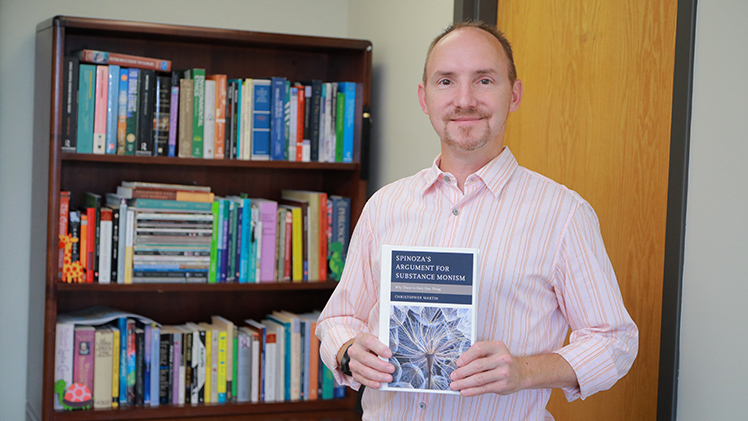When considering how to construct the narrative for his book about 17th century Dutch philosopher Baruch Spinoza, Dr. Christopher Martin imagined that he was having a conversation with a stranger at a party who knew nothing about philosophy, let alone Spinoza.
“That was my approach,” said Martin, an associate professor of philosophy in the Philosophy and Religious Studies Program in the College of Arts and Letters. “How would I explain this to those students who are following along so that they would be able to process it and think about it as well.”

Asked what he does when he isn’t teaching, Dr. Christopher Martin, an associate professor of philosophy, wrote “Spinoza’s Argument for Substance Monism: Why There is Only One Thing” to show what philosophy looks like in practice.
In fact, something similar that happened to Martin in real life served as the inspiration for the book, when his brother-in-law asked him what he did when he was not teaching.
“I gave him a very technical and far-too-complicated answer and he said he wanted one he could understand, so I gave him a very basic answer that made me sound like a loon,” Martin said. “So, I decided to try with a book to do that.”
The book, titled “Spinoza’s Argument for Substance Monism: Why There is Only One Thing,” ($89, Lexington Books) started as an attempt to provide an illustration of what professional philosophers do: to show what philosophy looks like in practice.
“To do so, I chose my favorite philosopher – Baruch Spinoza — and his most popular and controversial argument, substance monism,” Martin said. “I do my best to show someone who is curious about philosophy and may not have much experience with it how philosophical arguments are constructed and discussed.”
Martin, who has been teaching philosophy for 16 years, six of those at UToledo, said much of his inspiration in writing his book was his students.
“I was thinking that upper-level students would learn a lot about the practice of philosophy by reading the book. And since this branch of philosophy is almost entirely just thinking, it’s a great opportunity (if the book is successful) for students in any discipline to sharpen their thinking skills,” he said. “I had a lot of help from my colleagues at UToledo and at other institutions. I called in a lot of favors asking folks to read chapters, hear me out on ideas and arguments — things like that.
“The book would not have happened without the help of many other folks.”
One of those folks, Dr. Peter Feldmeier, the Murray/Bacik Professor of Catholic Studies, supported Martin all through his writing process.
“Dr. Martin is one of the leading figures in Spinoza scholarship,” Feldmeier said. “His latest book is both a guide to the essence of Spinoza as well as a philosophical tutoring on how to think.”
Far from light dinner conversation, “Spinoza’s Argument for Substance Monism: Why There is Only One Thing” is weighty enough to impact a reader’s life — or at least their outlook — if they are open to Martin’s pro-substance monism doctrine argument.
“Spinoza’s substance monism doctrine, as I read and argue for it, is a convincing or at least possibly convincing account of how reality is structured,” Martin said. “Adopting this point of view, even if for just a short while, will dramatically alter how someone thinks about and experience reality. And I think that others may be inspired to learn a little more philosophy too.”